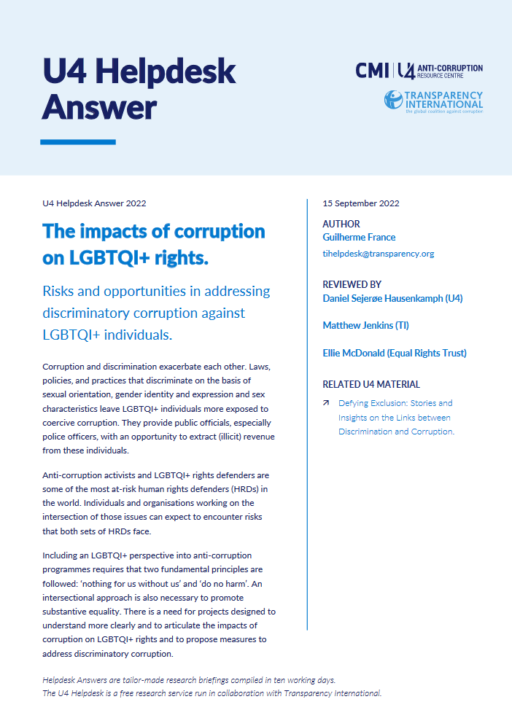
This Anti-Corruption Helpdesk brief was produced in response to a query from a U4 Partner Agency. The U4 Helpdesk is operated by Transparency International in collaboration with the U4 Anti-Corruption Resource Centre based at the Chr. Michelsen Institute.
Query
Please provide an overview of existing literature, examples, and experiences on how LGBTIQ+ people are especially affected by corruption. Which risks can they face when they engage in projects and advocacy on LGBTIQ+ and corruption, and what does that mean for the international donor community and particularly, for designers of anti-corruption projects?
Summary
Corruption and discrimination exacerbate each other. Laws, policies, and practices that discriminate on the basis of sexual orientation, gender identity and expression and sex characteristics leave LGBTQI+ individuals more exposed to coercive corruption. They provide public officials, especially police officers, with an opportunity to extract (illicit) revenue from these individuals.
Anti-corruption activists and LGBTQI+ rights defenders are some of the most at-risk human rights defenders (HRDs) in the world. Individuals and organisations working on the intersection of those issues can expect to encounter risks that both sets of HRDs face.
Including an LGBTQI+ perspective into anti-corruption programmes requires that two fundamental principles are followed: ‘nothing for us without us’ and ‘do no harm’. An intersectional approach is also necessary to promote substantive equality. There is a need for projects designed to understand more clearly and to articulate the impacts of corruption on LGBTQI+ rights and to propose measures to address discriminatory corruption.
Main points
- Corruption and discrimination exacerbate each other. Laws, policies, and practices that discriminate on the basis of sexual orientation, gender identity and expression and sex characteristics leave LGBTQI+ individuals more exposed to coercive corruption.
- Cases of extortion or sextortion of LGBTQI+ individuals by police officers have been reported in several countries.
- LGBTQI+ people are made more dependent on public services and, as such, corruption disproportionately impacts them.
- LGBTQI+ individuals do not regularly report abuses to the police for a range of reasons, including, for example, their fear of exposure and extortion and due to systematic impunity.
- Anti-corruption activists and LGBTQI+ rights defenders are some of the most at-risk human rights defenders.
- Two principles should be followed when including an LGBTQI+ perspective into anti-corruption programming: ‘do no harm’ and ‘nothing for us without us’. An intersectional approach is also necessary.
Contents
- Introduction
- Overview of the impact of corruption on LGBTQI+ people
- Discrimination renders LGBTQI+ people more vulnerable to corruption.
- Corruption takes forms that are intrinsically discriminatory.
- Discrimination based on sexual orientation and gender identity and expression and sex characteristics aggravates the effects of corruption on LGBTQI+ people.
- Discrimination raises barriers to prevent victims of corruption from seeking justice, while corruption can inhibit efforts to investigate and overcome discrimination.
- Corruption negatively impacts the political participation of LGBTQI+ people
Risks faced by human rights defenders
- LGBTQI+
- Anti-corruption
Including LGBTQI+ perspectives in anti-corruption programming
- ‘Nothing for us without us’
- ‘Do no harm’
- Intersectional approach
- Gaps and opportunities
References
Authors
Guilherme France, [email protected]
Reviewers
Daniel Sejerøe Hausenkamph (U4)
Matthew Jenkins (TI)
Ellie McDonald (Equal Rights Trust)
Date
19/09/2022
Tags
 Download PDF
Download PDF
